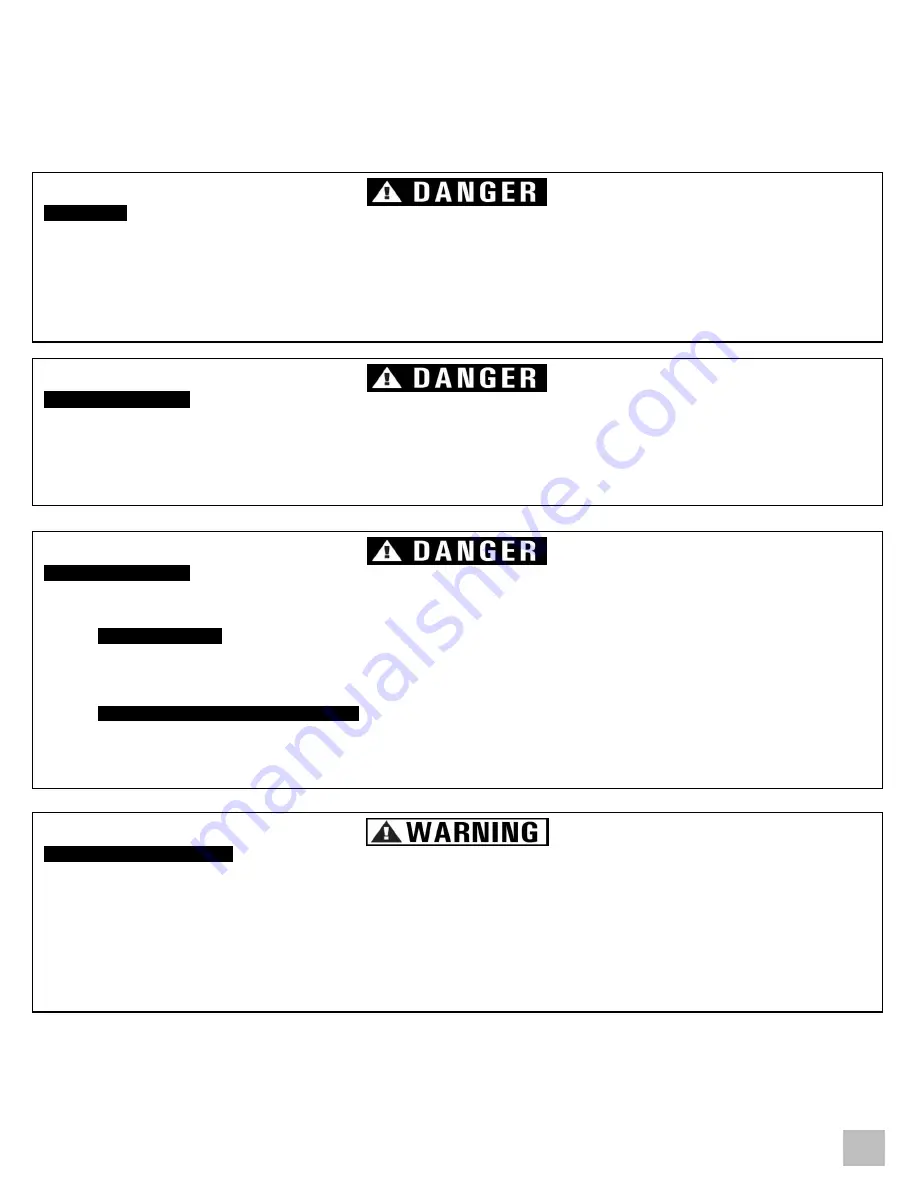
NEED HELP? 1-800-832-2966
8
Propane Safety:
Propane gas (also known as LPG, or PG) is a flammable liquid gas under pressure which can form explosive mixtures with air, and
cause other bodily harm if improperly handled.
In case of inhalation:
Persons suffering from lack of oxygen should be immediately moved to fresh air. If a victim is not breathing, administer artificial
respiration. If breathing is difficult, administer oxygen. ALWAYS obtain medical treatment immediately for any breathing difficulties.
Contact with liquid propane or cold vapor can cause freezing of tissue (frostbite):
In case of eye contact:
gently flush eyes with lukewarm,
NOT HOT
, water and seek medical attention immediately.
In case of skin contact:
Contact with liquid or cold vapor can cause frostbite. Immediately immerse the affected area in warm water, not to exceed 105°F
(40°C).
Fire and Explosion Hazards:
Propane gas (also known as LPG, or PG) is a flammable liquid gas under pressure which is easily ignited.
Propane is heavier than air:
It can collect in low areas, or travel along the ground where an ignition source may be present. Pressure can also build up in
the container due to heat, and the container can rupture if the relief devices should fail to function.
Storage:
Cylinders should be stored upright with valve protection in place. They should also be secured to prevent falling or tip-over. Protect cylinders from
physical damage, DO NOT drag, roll, slide or drop, and NEVER handle propane cylinders by the valve. Use a suitable hand truck or cart for cylinder
movement. Ensure all storage areas meet Class 1 Hazardous area standards, preferably outdoors, away from any source of ignition, with explosion proof
electrical enclosures, an
d posted “No Smoking or Open Flames” signs.
Fire and Explosion Hazards:
Propane smells like rotten eggs, a skunk’s spray, or dead animal. IF YOU SMELL GAS, NO FLAMES OR SPARKS! Immediately
put out all smoking materials or other open flames. Do not use electrical devices such as lights, appliances, or cell phones
—
sparks from these sources can
trigger an explosion or fire.
It can collect in low areas, or travel along the ground where an ignition source may be present. Pressure can also build up in the container
due to heat, and the container can rupture if the relief devices should fail to function.
Carbon Monoxide (CO):
Carbon monoxide is a byproduct of combustion and is a VERY DANGEROUS gas. CO can come from ANY fuel burning
device
. Very high levels of CO are possible from a device that is not operating properly, or from a chimney or venting system that is not functioning or
becomes blocked.
CARBON MONOXIDE CAN BE DEADLY! High levels of CO can cause dizziness, lack of consciousness, brain damage, and
ultimately death.
Symptoms of CO Poisoning include: headache, dizziness, fatigue, shortness of breath, and nausea.
If you suspect CO is present, ACT IMMEDIATELY:
1: If you or anyone shows physical symptoms of CO poisoning, get everyone out of the area and call 911 or your local Fire Department.
2: If it is safe to do so, open windows and doors to allow fresh air in, and shut off any devices you suspect may be releasing CO.
3: If no one has symptoms, but you suspect that CO is present, call your propane retailer, or qualified service personnel to check CO levels and ensure
equipment is operating and being vented properly.
Propane (LPG) as your Fuel Source:
This generator may emit highly flammable and explosive vapors when using LPG as the fuel source. Any nearby
flame source could cause an explosion resulting in bodily harm or even death.
Do not operate this generator near any open flame.
Always operate this generator on a firm, level surface.
Before starting this generator, inspect the LPG tank and valves for damage or leaks. You can use soapy water to spray the connections and look
for bubbles indicating a leak. Attach only approved tanks that have been properly filled by an approved filling station. DO NOT light or smoke
cigarettes.
Replace the hose at the first sign of cracks or leaks, or if age-cracking becomes apparent.
Always handle Propane fuels and generators outdoors.
Before transporting, disconnect the tank and close all valves. Ensure the generator fuel valve is off, and disconnect the spark plug.









































